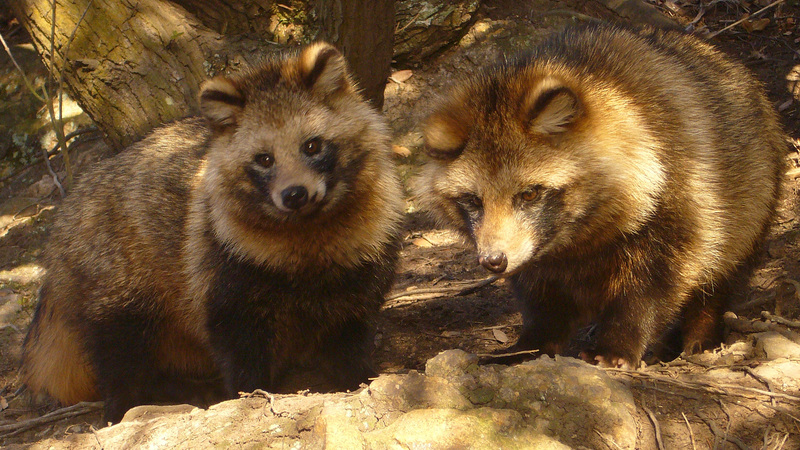|
| Query: raccoon | Result: 2nd of 320 | |
Raccoon Dog (Nyctereutes procyonoides) <!--일본 너구리--> - Wiki
| Subject: | Raccoon Dog (Nyctereutes procyonoides) - Wiki
| |

| Resolution: 2048x1152
File Size: 1187553 Bytes
Date: 2006:01:08 16:04:49
Camera: DMC-FX9 (Panasonic)
F number: f/2.8
Exposure: 10/500 sec
Focal Length: 174/10
Upload Date: 2006:12:26 21:10:02
|
ERROR : Server Busy(-1105)
ERROR : Server Busy(-1105)
Raccoon Dog (Nyctereutes procyonoides) - Wiki
Raccoon Dog
From Wikipedia, the free encyclopedia
[Photo] Copied from the Japanese Wikipedia @ http://ja.wikipedia.org/wiki/%E7%94%BB%E5%83%8F:Tanuki01_960.jpg Photographed by 利用者:663highland http://ja.wikipedia.org/wiki/%E5%88%A9%E7%94%A8%E8%80%85:663highland
The Raccoon Dog (Nyctereutes procyonoides "nycto-" = Gr. "night," "ereutes" = Gr. "wanderer," "procyon" = "raccoon," "-oides" = Gr. "-oid") is a member of the canidae family (which includes dogs, wolves, and foxes) and is indigenous to east Asia. It is not a true dog, and is the only species in its genus Nyctereutes. It is named for its superficial resemblance to the non-canidae raccoon. The animal carries historical and cultural significance in Japan, and is also known under the Japanese name tanuki.
Raccoon Dogs are native to Japan, southeastern Siberia, and Manchuria but now range as far as Scandinavia and France; in 2005, sightings were reported in Italy as well. Average adult head and body length is about 65 cm (2 ft) and weight ranges from 4 to 10 kg (9 to 22 lb). Average litters consist of 5 pups. Longevity is 3???4 years in the wild and 11 years in captivity. They are found in both plains and mountainous regions and are especially common in woodlands. Raccoon Dogs are commonly seen near villages and in rural areas.
Like many other canines, they are omnivorous. However, their diets are atypically diverse, consisting of invertebrates, frogs, lizards, rodents and birds along with seeds and berries. Those living near the ocean will also eat crabs and scavenged marine life.
Raccoon Dog populations have declined in recent years due to hunting, urbanization, an increase of animals associated with human civilization such as pets and abandoned animals, and diseases that may be transmitted between them. They are also killed for their fur in China.
Raccoon Dogs are secretive and not very aggressive; they prefer to hide or scream rather than fight, and play dead to avoid predators. They are monogamous; some fights occur between males for the females. Mating season begins when the tanuki emerge from their burrows. The female is in heat for about six days. The baculum tie in coitus lasts about six minutes, shorter than other canids. When the cubs are born after a gestation of about 60 days, the male will assist in cub-rearing, first by providing food to his mate and then also for the cubs when they are weaned, about 50 days after birth. The young are physically and sexually mature after one year.
The Raccoon Dog is a unique member of the canid family as it is the only member to go into torpor through the winter months. It is also unique in that its curved claws enable it to climb trees; the only other member of the canid family with this ability is the gray fox. It does not bark and it turns its tail into an inverted U to express dominance. The brain of the tanuki is poorly developed compared to dogs and wolves and its teeth are small.
There is some debate in the scientific community regarding speciation between the Siberian subspecies (N. p. ussuriensis), Chinese subspecies (N. p. procyonoides) and the Japanese Raccoon Dog subspecies (N. p. viverrinus) in that due to chromosome[1], behavioral and weight differences, the Japanese Raccoon Dog should be considered a separate species from the two other subspecies.
Sean John Controversy
On December 22, 2006, fur-hooded jackets made by the Sean John clothing company were pulled off the shelves of Macy's Department Stores when the nation’s largest animal protection organization concluded that the garments were actually made from raccoon dog. Previously advertised as a faux fur product, they were later identified. Wayne Pacelle, president and CEO of the Humane Society of the United States, added that the issue is an “industry-wide problem” and its investigation demonstrated that retailers and designers “aren’t paying close enough attention to the fur trim they are selling.” He added that the issue is especially problematic when “the fur is sourced from China, where domestic dogs and cats and raccoon dogs are killed in gruesome ways.”
http://en.wikipedia.org/wiki/Raccoon_Dog
| The text in this page is based on the copyrighted Wikipedia article shown in above URL. It is used under the GNU Free Documentation License. You may redistribute it, verbatim or modified, providing that you comply with the terms of the GFDL. |
|
Comments |
|---|
| | Guest |
|
Scientific Name: Nyctereutes procyonoides (Gray, 1834)
Common Names: Raccoon Dog, Asiatic Raccoon; [French] Chien viverrin; [Spanish] Perro Mapache
Synonyms:
Canis procyonoides Gray, 1834
Canis viverrinus Temminck, 1838 |
^o^
Animal Pictures Archive for smart phones
^o^
|
|
|

